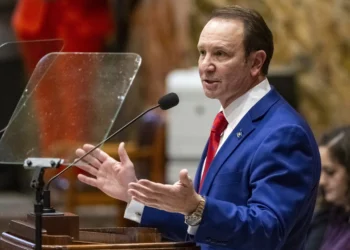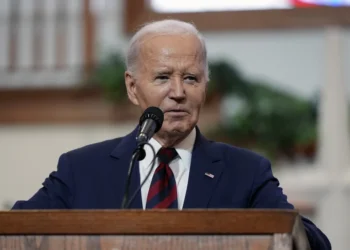In a marathon hearing that began Tuesday afternoon, the House Energy and Commerce Committee started marking up legislation to slash green subsidies authorized by the landmark climate bill signed by former President Joe Biden.
Republican members on the committee are seeking to cut billions of dollars in funding from climate initiatives established through the 2022 Inflation Reduction Act, which was passed by Democrats. The committee’s legislation would cancel up to $6.5 billion in unspent funding from the Inflation Reduction Act.
The committee’s legislation is just part of the multitrillion-dollar tax-and-spending bill the GOP plans to pass through budget reconciliation, a process that allows for bills to bypass the filibuster and pass with only a simple majority in the Senate. The reconciliation is meant to implement President Donald Trump’s domestic agenda. The centerpiece is an extension of the tax cuts Republicans enacted in 2017.
In an effort to modify the bill or delay its passage, Democrats submitted several amendments to avert Republican provisions that would slash climate funding. With Republicans holding the majority in the House, most amendments were not expected to pass.
Rep. Scott Peters (D-CA) said that, while Republicans say they favor an “all above approach” to energy, the reconciliation bill in fact “picks winners and losers and elevates expensive, outdated and inefficient sources like coal, over cheap America-made energy, like solar, wind, and storage.”
Rep. Frank Pallone (D-NJ), the top Democrat on the panel, criticized the energy-related title of the legislative text, accusing Republicans of “creating a mockery” of U.S. environmental laws.
He specifically took issue with a provision intended to speed up the permitting process for energy development projects, particularly those in the oil and gas industries. The provision, which mirrors one included in the House Natural Resources Committee’s portion of the proposed reconciliation bill, would allow developers to pay a fee for expedited reviews.
Specifically, it would allow the Department of Energy to deem a liquefied natural gas facility as a project in “the public interest” if applicants pay a million-dollar fee. Developers trying to secure permits for other natural gas projects would also be able to receive expedited permits from the Federal Energy Regulatory Commission if they pay 1% of their expected cost of construction or $10 million.
“By allowing Big Oil and Gas to simply bribe government agencies to acquire permits free of scrutiny, it sets up what I call a pay to play scheme for fossil energy permitting that allows polluters to pay $10 million to the Trump administration to obtain pipeline permits and ignore environmental laws while clean energy gets left behind,” Pallone said.
Democrats criticized the proposal as “pay to play” policy. Rep. Alexandria Ocasio-Cortez (D-NY) proposed an amendment to order the Energy Department’s Inspector General to ensure that the bill does not increase the risk of corruption.
“We cannot allow polluters to bribe their way around these processes,” Ocasio-Cortez said. “We cannot fast-track corruption that allows massive corporations to put people’s lives at risk.”
Rep. Dan Crenshaw (R-TX) argued that the bill’s policy is a “user fee,” adding that “all the laws that govern permitting must be followed.”
“There are already laws preventing corruption, however you mean that word,” Crenshaw said. In an attempt to turn the tables on Democrats, he said that the Inflation Reduction Act provided hundreds of billions of dollars to non-governmental organizations for clean energy projects, but it is unclear where the money went.
The committee did not pass Ocasio-Cortez’s amendment.
While dozens of amendments had been proposed regarding the energy subtitle of the legislative text, committee Republicans voted to skip deliberation of those changes and instead advance discussions to the environment section of the proposal after roughly two hours.
Among the provisions Democrats have criticized are plans to cut funding from climate programs like the Environmental Protection Agency’s Greenhouse Gas Reduction Fund, which provides grants for clean energy projects across the country, specifically in low-income areas. The Trump EPA has taken aim at the program, claiming the Biden administration mismanaged the program’s funds, in part by routing the money through Citibank to be disbursed.
The bill also would terminate the “unobligated balance” of Inflation Reduction Act funding from DOE’s Loan Programs Office, essentially slashing the office’s loan authority to pre-Biden administration levels.
As of Monday, committee staff were unable to say how much of the office’s funds were not obligated. Industry experts have said that the move would effectively eliminate the office and dramatically limit federal support for new energy projects.
CAPITOL POLICE ARREST PROTESTERS AS HOUSE GOP BEGINS MEDICAID BUDGET HEARING
Tuesday’s markup hearing was anticipated to continue for several hours, likely stretching into Wednesday morning. The first, and only anticipated, break in the hearing came just after 6:30 p.m., as lawmakers headed to the floor for scheduled votes.
Some lawmakers predicted it could last anywhere between 24-36 hours, depending on procedural delays or amendments proposed by Democrats on the committee. With Republicans in the majority, the proposed text is anticipated to pass through committee.

















